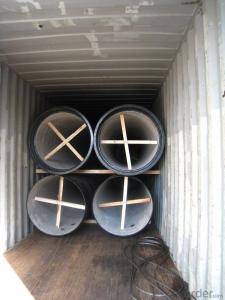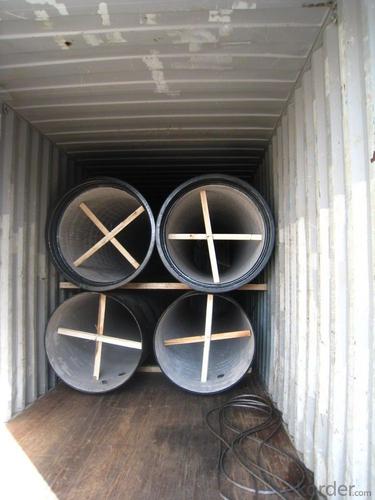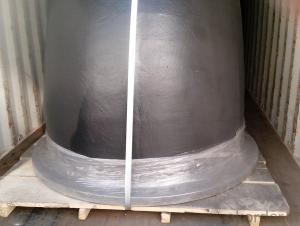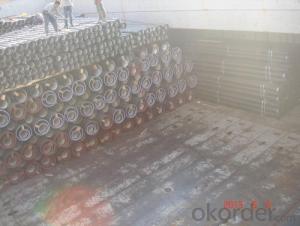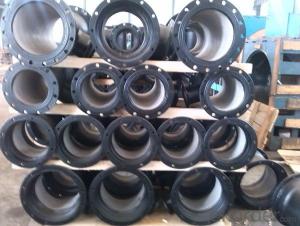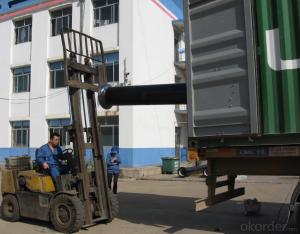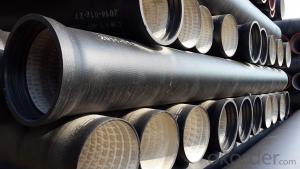DUCTILE IRON PIPE DN1000 C
- Loading Port:
- Tianjin
- Payment Terms:
- TT OR LC
- Min Order Qty:
- -
- Supply Capability:
- 30000Tons m/month
OKorder Service Pledge
OKorder Financial Service
You Might Also Like
CNBM ductile iron pipe ranges from DN80-DN1600mm (T-Type, Class K9), effective length 6m, comply with ISO2531 Standard
Company Profile
CNBM International Corporation is the leading production base and renowned supplier of Ductile Iron Water Pipe systems of both potable and waste water in China. We are constantly looking to develop high quality products to ensure the longest service life and wonderful performance.
CNBM Pipelines regard quality as the essential factor leading to successful business. Every pipe is tested in accordance with BS EN545 (water application) or BS EN598 (sewer application). CNBM Pipelines products comply with and are tested according to the relevant European and International Standards. Our pipes are manufactured under the quality management system BS EN ISO 9001. After years of efforts, CNBM Pipelines has built up great reputation in terms of quality and service among customers worldwide
Product Introduction
CNBM ductile iron pipe ranges from DN80-DN1600mm (Tyton, T-Type, Class K7/K8/K9), effective length: 6m, complying with BS EN545/EN598/ISO2531/BS4772.
Specification& Payment terms
Internal lining: Pipes shall have an internal cement mortar lining in acc with ISO4179.
External coating: Pipes shall be externally coated with metallic zinc spray plus a further layer of resin painting to ISO8179.
Gasket: 100% SBR/NBR/EPDM gasket in accordance with ISO4633.
Packing: Pipes from DN100 to DN300 be bundled with steel belts, the others are in bulk.
Payment term: By 30% T/T advance payment + 70% Irrevocable L/C at sight.
Packing: In bulk vessel or in container.
- Q: Are ductile iron pipes suitable for irrigation systems?
- Ductile iron pipes are a great fit for irrigation systems. They are renowned for their durability, strength, and resilience, which makes them an excellent choice for various applications, including irrigation systems. These pipes are capable of withstanding high water pressure and are resistant to corrosion, ensuring the efficiency and longevity of the irrigation system. Furthermore, ductile iron pipes have a smooth interior surface that minimizes friction and allows for efficient water flow, guaranteeing optimal operation of the irrigation system. In addition, these pipes have a long lifespan, reducing the need for frequent replacements and maintenance, making them a cost-effective option for irrigation systems. In conclusion, ductile iron pipes are highly suitable for use in irrigation systems due to their durability, strength, corrosion resistance, and efficient water flow.
- Q: What are the different types of coatings available for ductile iron pipe?
- The different types of coatings available for ductile iron pipe include cement mortar lining, polyethylene sleeving, polyurethane coatings, and epoxy coatings. Each coating offers specific benefits such as corrosion resistance, improved flow characteristics, and protection against external elements.
- Q: How does ductile iron pipe perform in seismic conditions?
- Seismic conditions are where ductile iron pipe truly shines. This type of pipe has gained a reputation for its outstanding performance in such situations, making it the go-to choice for underground water and wastewater systems, particularly in earthquake-prone areas. The remarkable strength and flexibility of ductile iron pipe make it highly resistant to seismic forces. It can withstand the ground movements and vibrations caused by earthquakes without suffering significant damage or failure. The secret lies in its unique composition, which consists of a high iron content combined with small amounts of carbon and other alloying elements. The crucial advantage of ductile iron pipe in seismic conditions is its ability to absorb and dissipate seismic energy through its inherent flexibility. When the ground shifts during an earthquake, the pipe can adapt and deform slightly to accommodate the movement. This minimizes stress concentrations and reduces the risk of fractures. Furthermore, the joint integrity of ductile iron pipe is exceptional, a vital characteristic in seismic conditions. The joints are designed to offer maximum strength and resistance against external forces, including seismic activity. Different joint types, such as push-on, mechanical, and restrained joints, are available to suit various seismic requirements and installation conditions. Not only does ductile iron pipe possess impressive mechanical properties, but it also offers long-term corrosion resistance. Typically, the pipe is lined with a cement mortar or a protective coating, acting as a barrier against corrosive elements present in the soil or water. This corrosion resistance ensures the pipe's structural integrity and longevity, even in regions with high seismic activity. Overall, ductile iron pipe has a proven track record of exceptional performance in seismic conditions. Its strength, flexibility, joint integrity, and corrosion resistance make it a reliable choice for underground infrastructure, providing secure and efficient water and wastewater systems in areas prone to earthquakes.
- Q: What are the typical lengths of ductile iron pipes?
- The typical lengths of ductile iron pipes can vary depending on the specific project requirements and industry standards. However, commonly used lengths for ductile iron pipes range from 18 feet (5.5 meters) to 20 feet (6 meters). These lengths are suitable for various applications such as water distribution, wastewater systems, and industrial pipelines. It is important to note that custom lengths can also be manufactured to meet specific project needs.
- Q: What is the expected hydraulic efficiency of ductile iron pipes?
- Several factors, including pipe diameter, roughness of the pipe surface, flow rate, and length of the pipe, can affect the expected hydraulic efficiency of ductile iron pipes. However, it is generally acknowledged that ductile iron pipes exhibit exceptional hydraulic efficiency. Ductile iron pipes possess an inner surface that is smooth, thereby reducing frictional losses and facilitating efficient water flow. The smoothness of the pipe surface serves to minimize energy losses caused by turbulence and resistance. Furthermore, ductile iron pipes are engineered to maintain a consistent and uniform internal diameter, which further enhances their hydraulic efficiency. Research has demonstrated that hydraulic efficiencies of ductile iron pipes can range from 85% to 95%. This indicates that a significant portion of the energy inputted into the system is effectively transferred to the water, resulting in minimal losses. It should be noted that the hydraulic efficiency of ductile iron pipes can be influenced by factors like corrosion, scaling, and sediment accumulation over time. Regular maintenance and appropriate cleaning procedures can help preserve the hydraulic efficiency of ductile iron pipes. In summary, ductile iron pipes are widely regarded for their high hydraulic performance and are extensively utilized in water distribution systems due to their ability to convey water with minimal energy losses.
- Q: What effect does magnesium play in nodular cast iron?
- Magnesium can be graphite precipitated in spherical form.But the specific mechanism is not clear, and now it is still debated in the academic circles.In addition, magnesium and sulfur generate MgS, which removes S from molten iron, which impedes the formation of spheroidal graphite.Therefore, Mg has two functions to eliminate the influence of S on Nodular Iron and promote the precipitation of graphite in spherical form.
- Q: What are the typical joint sealing requirements for ductile iron pipes?
- The typical joint sealing requirements for ductile iron pipes include the use of rubber gaskets or mechanical joints. Rubber gaskets are commonly used for joint sealing in ductile iron pipes as they provide a reliable and flexible seal. These gaskets are typically made of synthetic rubber materials that are resistant to water, chemicals, and other environmental factors. Mechanical joints, on the other hand, are another common method of joint sealing in ductile iron pipes. These joints consist of a mechanical device that connects the pipes together and provides a watertight seal. Mechanical joints are typically designed to allow for some movement and flexibility, which is especially important in areas where ground movement or settlement may occur. In addition to using rubber gaskets or mechanical joints, it is also important to properly clean and prepare the pipe surfaces before making the joint. This may involve removing any dirt, debris, or old joint material from the pipe ends to ensure a proper seal. The joint should then be assembled according to the manufacturer's instructions, ensuring that the gasket or mechanical joint is correctly positioned and tightened to the recommended torque. Overall, the typical joint sealing requirements for ductile iron pipes involve the use of rubber gaskets or mechanical joints, proper cleaning and preparation of the pipe ends, and following the manufacturer's instructions for assembly. These requirements are essential for ensuring a watertight and durable joint that can withstand the pressures and environmental conditions commonly encountered in ductile iron pipe systems.
- Q: How does the white iron appear in the case of ductile iron?
- The addition of 0.2% SiC in the raw iron water can effectively reduce the chill.
- Q: Can ductile iron pipes be used for underground geothermal systems?
- Yes, ductile iron pipes can be used for underground geothermal systems. Ductile iron pipes are known for their strength, durability, and resistance to corrosion, making them suitable for various applications, including underground geothermal systems. These pipes can handle high temperatures and pressures, making them ideal for the transport of hot geothermal fluids. Additionally, ductile iron pipes have a long service life and can withstand the ground movements and stresses that occur in underground installations. Therefore, they can be a reliable choice for underground geothermal systems.
- Q: What is the difference between a cast iron pipe and a ductile iron pipe?
- Nodular cast iron has high strength and strong plasticity. The tensile strength of ductile iron is twice that of gray iron, and the yield strength even exceeds that of cast steel.
Send your message to us
DUCTILE IRON PIPE DN1000 C
- Loading Port:
- Tianjin
- Payment Terms:
- TT OR LC
- Min Order Qty:
- -
- Supply Capability:
- 30000Tons m/month
OKorder Service Pledge
OKorder Financial Service
Similar products
Hot products
Hot Searches
Related keywords
